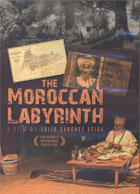
The Moroccan Labyrinth 2007
Distributed by Icarus Films, 32 Court St., 21st Floor, Brooklyn, NY 11201; 800-876-1710
Produced by Intermedia Producciones
Directed by Julio Sánchez Veiga
DVD, color, 90 min.
Sr. High - Adult
Morocco, African Studies, Spain, Postcolonialism, History, European Studies
Date Entered: 12/17/2009
Reviewed by Janis Tyhurst, Reference Librarian, George Fox UniversityThe Moroccan Labyrinth provides a good chronological history of 20th century conflicts between Spain and Morocco. It focuses on the role Spain played in Morocco during the first 30 years and the role of Moroccans in the Spanish Civil War. The film divides the history into 7 chapters (Spain in Morocco; Resistance; Revenge; Alliance with France; Civil War in Spain; Shock Troops; and Illegal Immigrants). It weaves together historical film footage and photographs from the Spanish Moroccan war and the Spanish Civil War with interviews of European historians. The historians explain the development of the conflicts and place them within their historical contexts, and their explanations are juxtaposed with interviews with Moroccans who fought in the Spanish Civil War. The film moves along well, bringing in the various major figures and providing background on them. The interviews are in Arabic, Spanish or French with English subtitles. There are explanatory notes in English at the beginning of the chapters.
After the United States defeated Spain in 1898 and took over Spain’s former colonies of Puerto Rico, Cuba and the Philippines, Spain turned its full attention to keeping Morocco. It was politically important to maintain a colony after the loss of the other areas, the Spanish Army desperately needed to regain respect and Morocco was conveniently located just across the Mediterranean, making it easier to supply and control. However, the war was not popular with the Spanish people, the Spanish army did not do a good job of training the recruits and the wealthy could escape the compulsory military service by buying their way out. The Moroccans were poor, hungry and ill equipped, but had a charismatic leader in Abd El Krim El-Khattabi from the Rif area of Morocco. The early years of the conflict were primarily just skirmishes with each side evenly handicapped, but in 1921 the war took an ugly turn with the massacre of 12,000-14,000 Spanish soldiers during a two week period called the Defeat of Annual. Back in Spain the massacre had major political repercussions starting with General Primo de Rivera’s coup in 1923 and ending with the collapse of the Spanish monarchy in 1931.
After the Defeat of Annual, the Spanish started a revenge campaign starting with indiscriminate mutilations (cutting off noses, ears or decapitating the dead) and progressed to chemical and TNT bombings of villages and markets, killing civilians intentionally. Within the Spanish Army, a cadre known as Africanists became the shock troops. The Africanists were brutal and without ethics. This group would form the core of the Falangist movement in the Spanish Civil War. The war turned against Abd El Krim and the Moroccans when he attacked the French. France and Spain united against the Moroccans and by 1926 had defeated them. The French, under General Pétain, used Senegalese troops while the Spanish were still using compulsory Spanish troops. One of the most startling points is the distinction the Moroccans make is not nationality, but religion. During several of the interviews, the Moroccans did not talk about the “Spanish” or the “French,” they talked about the “Christians.”
Ironically, Moroccans would join the Nationalist movement supporting the group that had defeated them. The Africanists were the commanding officers in the Nationalist movement and in charge of the Moroccan troops. They joined because again poverty was so widespread. The Nationalist Army paid well, fed and clothed the troops and allowed them to loot. General Franco, who had fought in the Spanish Moroccan wars, told his commanders to treat the Moroccans well. The Moroccans were used as the shock or advance troops in the Spanish Civil War. Under the leadership and with the encouragement of the Africanists, they committed many of the atrocities that the Africanists had used against them. After the end of the Civil War, the Moroccans were forcibly expelled from Spain.
This film would be most valuable in a class where there is already some understanding of the 20th century history between Spain and Morocco. There are good subtitles and the production qualities are very good.